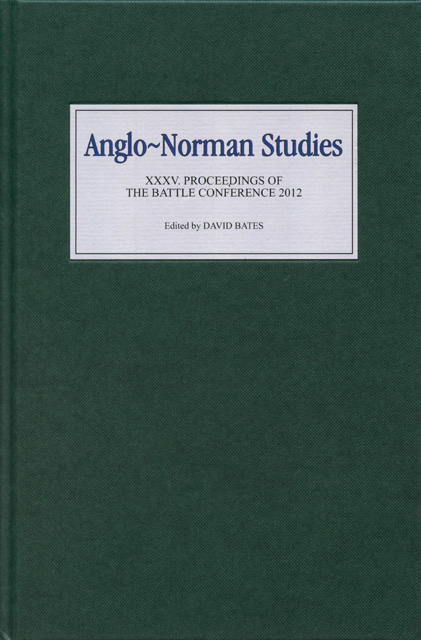Book contents
- Frontmatter
- Dedication
- Contents
- List of Illustrations and Tables
- Editor’s Preface
- Abbreviations
- A Three-Cornered Dynamic of Redemption in the ‘Long’ Thirteenth Century: Villein Manumissions and the Theology of the Incarnation (The R. Allen Brown Memorial Lecture, 2011)
- Femmes en religion, personnes d’autorité: les abbesses normandes (XIe–XIIIe siècles) (The R. Allen Brown Memorial Lecture, 2012)
- The Role of the Curator of the Bayeux Tapestry
- Early Normandy
- The Norman Conquest, Countess Adela, and Abbot Baudri
- Baldric of Bourgueil and the Flawed Hero
- John Bilson (1856–1943) and the Study of Anglo-Norman Romanesque
- The Identity of the Designer of the Bayeux Tapestry
- The Pseudo-Hugh Falcandus in His Own Texts
- The Thirteenth-Century Chronique de Normandie
- Les investitures abbatiales en Normandie: quelques réflexions autour du cas de l’abbaye du Bec-Hellouin (1034–1136)
- Robert Curthose: The Duke Who Lost His Trousers
- Sufficientia: A Horatian Topos and the Boundaries of the Self in Three Twelfth-Century Poems
- Aristocratic Acta in Normandy and England, c. 1150–c. 1250: The Charters and Letters of the Du Hommet Constables of Normandy
- Crime without Punishment: Medieval Scottish Law in Comparative Perspective
- Landscape and Belief in Anglo-Norman England
- Contents of Volumes 1–34
Baldric of Bourgueil and the Flawed Hero
Published online by Cambridge University Press: 28 February 2023
- Frontmatter
- Dedication
- Contents
- List of Illustrations and Tables
- Editor’s Preface
- Abbreviations
- A Three-Cornered Dynamic of Redemption in the ‘Long’ Thirteenth Century: Villein Manumissions and the Theology of the Incarnation (The R. Allen Brown Memorial Lecture, 2011)
- Femmes en religion, personnes d’autorité: les abbesses normandes (XIe–XIIIe siècles) (The R. Allen Brown Memorial Lecture, 2012)
- The Role of the Curator of the Bayeux Tapestry
- Early Normandy
- The Norman Conquest, Countess Adela, and Abbot Baudri
- Baldric of Bourgueil and the Flawed Hero
- John Bilson (1856–1943) and the Study of Anglo-Norman Romanesque
- The Identity of the Designer of the Bayeux Tapestry
- The Pseudo-Hugh Falcandus in His Own Texts
- The Thirteenth-Century Chronique de Normandie
- Les investitures abbatiales en Normandie: quelques réflexions autour du cas de l’abbaye du Bec-Hellouin (1034–1136)
- Robert Curthose: The Duke Who Lost His Trousers
- Sufficientia: A Horatian Topos and the Boundaries of the Self in Three Twelfth-Century Poems
- Aristocratic Acta in Normandy and England, c. 1150–c. 1250: The Charters and Letters of the Du Hommet Constables of Normandy
- Crime without Punishment: Medieval Scottish Law in Comparative Perspective
- Landscape and Belief in Anglo-Norman England
- Contents of Volumes 1–34
Summary
It is rare for us to have a critique of a medieval text by a number of contemporary authors, and even more uncommon for it to be roundly panned. But this is what happened to the Gesta Francorum, a history of the First Crusade written by an anonymous witness to those events. Guibert of Nogent said it was ‘pieced together in words more simple than was appropriate’, while Robert the Monk called it ‘uncertain and unsophisticated in its style and expression’. These critical appraisals were written in northern France less than ten years after the composition of the Gesta and reflect an understanding of the purpose of written history and the authorial standards set by two members of the ‘literati’ of that region.
Baldric of Bourgueil shared this view and wrote in the prologue to his Historia Ierosolimitana:
Non tamen huic beate interesse promerui militiae, neque uisa narraui; sed nescio quis compilator, nomine suo suppresso, libellum super hac re nimis rusticanum ediderat; ueritatem tamen texuerat, sed propter inurbanitatem codicis, nobilis materies uiluerat; et simpliciores etiam inculta et incompta lectio confestim a se auocabat.
Baldric, having been made aware through the Gesta of the narrative of the First Crusade, seems disappointed that the ‘nobility’ of the subject had been cheapened by the poor way in which it was presented and reported. For Baldric, as for Guibert and Robert, it seems the theological significance of these events, their meaning and potential as an exemplum to Christians had been lost, because they had been reported without what they thought of as the appropriate level of sophistication, cultivation, or organization. Baldric continues in his prologue to explain that he felt compelled to apply what talent he had to recapitulating the Gesta, going over the main points of the narrative again, including stories he had garnered from his own sources and adding the polish and elegance he felt the Gesta lacked.
Some modern historians have assumed that this added polish and elegance meant simply improvements to the Gesta’s ‘literary style’:6 an understandable response given Baldric’s fame as a poet. He certainly added flowery phrases, made clever use of alliteration and assonance, and inserted impressive classical and Biblical allusions, but other more notable textual changes indicate that he believed the Gesta lacked something much more vital than poetic language, a lack which Baldric thought significantly undervalued the memory of the First Crusade.
- Type
- Chapter
- Information
- Anglo-Norman Studies 35Proceedings of the Battle Conference 2012, pp. 79 - 94Publisher: Boydell & BrewerPrint publication year: 2013
- 1
- Cited by

